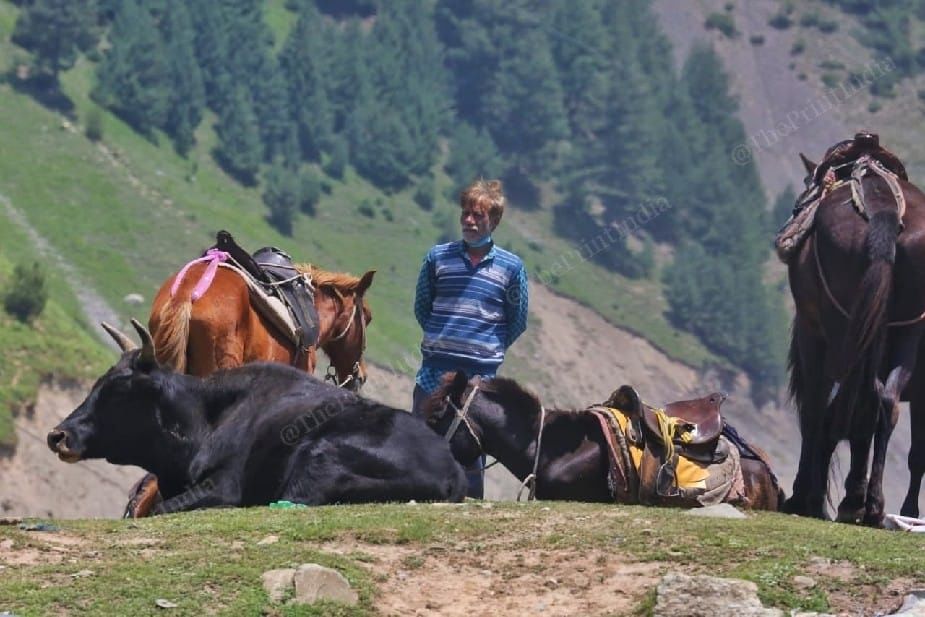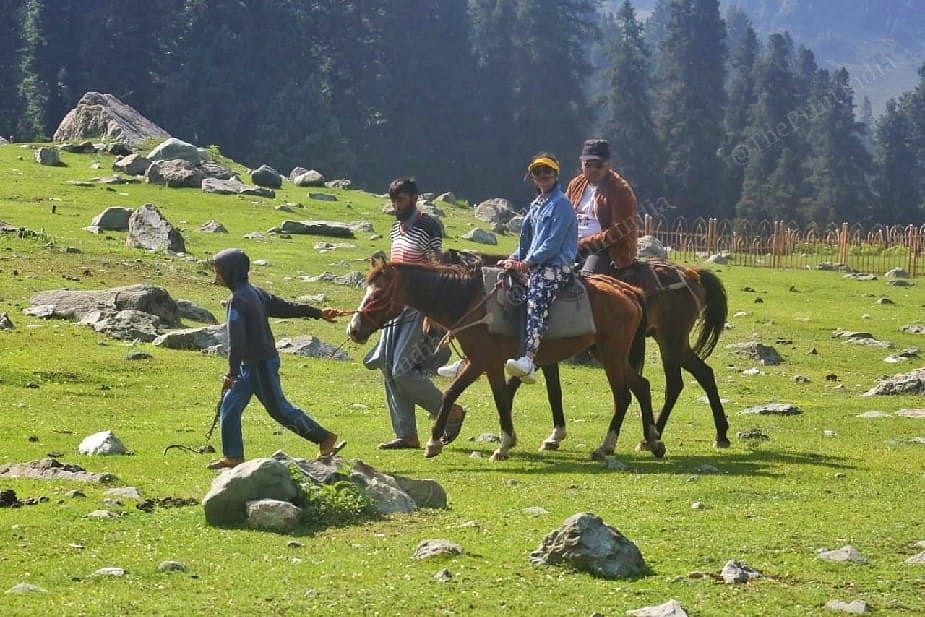
Sonmarg: Sitting on a rock, Farooq Ahmed Bhatt (40), a ghodawallah (horse porter) of Sonmarg, Kashmir, is smoking a beedi — his gaze fixed on the cars entering the area. As a couple gets down from one of the cars, and starts looking around, Bhatt stubs his beedi and sprints. He signals to his 10-year-old son to follow him.
“Aiye, ghode pe baithiye. Aapko sabse khoobsurat spot pe le chalunga (Come, sit on this horse, I will take you to the most beautiful spot here),” he says. The couple shrugs and passes up.
Bhatt returns to the rock, in wait for another car, dejection writ large on his face. His son — looking equally disappointed — perches next to his father, waiting for his next instruction.
In the scenic Sonmarg, ghodawallahs like Bhatt offer horse rides that help tourists navigate the tough terrain to discover some of the area’s hidden gems — from waterfalls to lakes. They also help pilgrims chart the 15-km trek, back and forth, between the Baltal base camp and the Amarnath cave.
Usually, July — which marks the Amarnath Yatra season (June to August) — is a month of booming business for Sonmarg’s ghodawallahs.
But 2021 marks the third successive season when the yatra has been cancelled — in 2019, it was because of security concerns surrounding the government’s decision to scrap Article 370, and Covid has been to blame in the two subsequent years. It is a knock that has left Sonmarg’s ghodawallahs — approximately 250 in number — struggling.

There is some business in light of certain relaxations in lockdowns across the country after the second wave, but it is almost negligible.
“Three years ago, during the yatra time, we used to earn Rs 5,000 a day and, for the rest of the year, especially the summer, tourists flocked to the area. However, now we are not even making Rs 2,000 a month and are in heavy debt. There are some days when we have nothing to eat,” Bhatt said.
Speaking to ThePrint, Ganderbal Resident Deputy Commissioner Farooq Ahmad acknowledged the problem, but said the situation has been bad for the entire country and Sonmarg is no exception.
“Covid-19 affected the entire country, in fact, the entire world. The yatra was cancelled for two years because of Covid and one year due to security concerns which led to massive losses. But now things are picking up. We are slowly opening up places for tourists, keeping in mind Covid-appropriate behaviour,” he said.
‘My father trained me, I am training my son’
Bhatt was 10 years old when he first made the trek from the Baltal base camp to the Amarnath cave. His father, also a ghodawallah who ferried pilgrims for the yatra, wanted to train him young.
“It is a family business. My father trained me how to ride a horse in Sonmarg first. At that time, I was 8 or 9 years old. When I turned 10, he told me that now is the time to take me for the yatra,” he said.
“He showed me the route, taught me the tricks and trained me for a year. From the next year, I had my independent ghoda, and started taking pilgrims. My father would follow me, though.”
He added: “Earlier, this route was very difficult, there used to be landslides, and there were too many rocks, but it has become much better since.”

Now, Bhatt’s father is at an advanced age and unable to make the trek. So, he is imparting the tricks of the trade to his son Imran, 10.
“I have taught him how to ride and have also shown him routes to some tourist spots. He is very enthusiastic and a good climber,” Bhatt told ThePrint. “I had thought that, this year, I would take him for the Amarnath Yatra too, so that, from next year, he can take tourists independently and contribute some money to the house, but the plan did not work out,” he said.
Asked why he did not send his son to school, Bhatt smirked.
“This is all we do. My father passed it on to me, I will pass it on to my son,” he said. “There is too much poverty. If I do this alone, I won’t be able to feed my family.”
Taking up alternative professions
With three back-to-back years of slow business, many ghodawallahs have taken up alternative professions. While some work at construction sites, lifting mortar, others have taken to agriculture. Even so, life remains tough.
“We were all unemployed, there was nothing. With no savings and all our rations getting exhausted, we took up small-time labour jobs in the vicinity. We requested some orchard owners, zamindars, to give us some work. We also had to borrow a lot of money and now we are in huge debt,” Bashara Ahmad Thikri, another Sonmarg ghodawala, said.
“Some days, we even had to barter things to cook a day’s meal. Such is the situation. If this goes on, none of us will be able to survive,” he added.
Bhatt, however, spoke of hope that more tourists will start coming in as Covid-19 restrictions ease further, and that the Amarnath Yatra will be held next year.
“For the past two weeks, some tourists have started coming in. It is a good sign, and we hope tourist arrivals return to earlier levels soon. We do not know much about this disease, but it has hit us all badly and we just hope that it subsides and everything is back to normal,” Bhatt said.
As Bhatt said this, as if on cue, a tourist approached him to enquire about local attractions he could visit on a horse.

Bhatt listed the hotspots in one breath, naming them by the movie that made them famous — “’Ram Teri Ganga Maili’ jharna (waterfall), ‘Satte pe Satta’ ground, ek spot jahan ‘Bajrangi Bhaijaan’ ki shooting hui thi, aapko sab dikhayenge (one spot where ‘Bajrangi Bhaijaan’ was shot, we will show you everything)”.
When the tourist asked about the charges, Bhatt was quick to respond: “Main kuch nahi maang raha. Jo aapki ichha hai woh de dena (I am not asking for anything. Give us whatever you think is ok).”
Bhatt then signalled to his son to get the horses without wasting any time. He made the tourists sit on the horses and started the trek. His first destination — a lake that requires a one-hour trek uphill.
(Edited by Sunanda Ranjan)
Subscribe to our channels on YouTube & Telegram
Why news media is in crisis & How you can fix it
India needs free, fair, non-hyphenated and questioning journalism even more as it faces multiple crises.
But the news media is in a crisis of its own. There have been brutal layoffs and pay-cuts. The best of journalism is shrinking, yielding to crude prime-time spectacle.
ThePrint has the finest young reporters, columnists and editors working for it. Sustaining journalism of this quality needs smart and thinking people like you to pay for it. Whether you live in India or overseas, you can do it here.